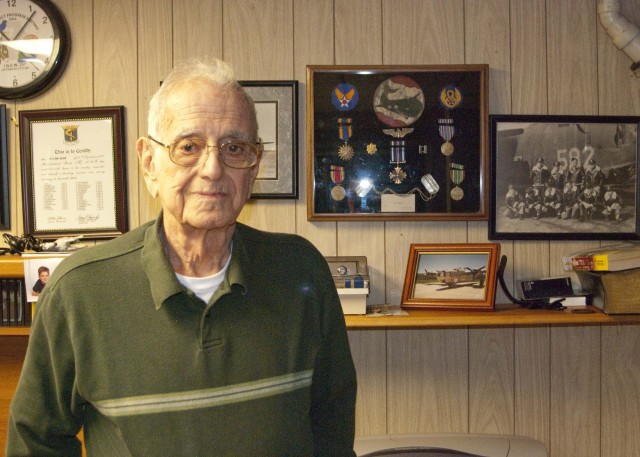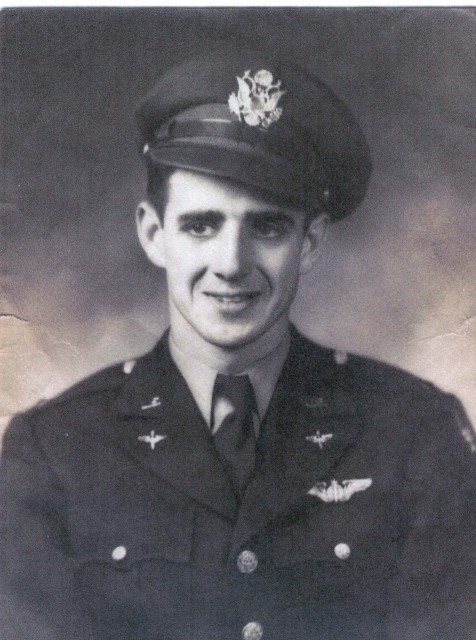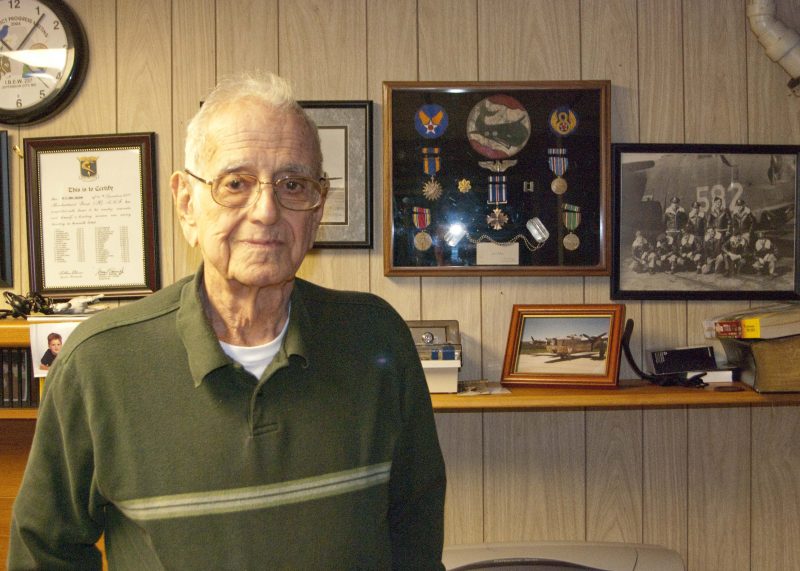By Jeremy P. Amick
With a recollection of events as lucid as if they occurred yesterday, Jefferson City, Mo., resident John Sullivan, 89, enjoys sharing the story of his service in the skies above Europe during a war nearly seven decades passed.

Raised in the Mid-Missouri area, Sullivan graduated from Jefferson City High School in 1941, just months prior to an event which drew the country into World War II.
“I had begun working for my uncle who was an electrical contractor,” Sullivan said. “But after the Japanese attacked Pearl Harbor, I knew I could join (the service) or be drafted.”
With an interest in flying, the 18-year-old traveled to Ft. Leonard Wood to enlist in the Army Air Corps’ Aviation Cadet Program in May 1942. As he recalls, the program was seeking pilots, navigators and bombardiers.
He completed six weeks of basic training in San Antonio and was sent to Ellington Field in Houston for pre-flight training. While in Houston, he took classes on communication skills such as Morse code in addition to basic courses on weather and physics.
The next step in his aviation preparation took place in Laredo, Texas, where he was introduced to several aspects of aerial gunnery.
“We learned how to operate .50 caliber machine guns and all types of military weapons,” Sullivan recalled. “There was also a point in the training where we fired in flight at moving targets with a .30 caliber machine gun while in the back seat of an AT-6 fighter trainer.”
Later practicing firing techniques from on board an actual bomber, Sullivan graduated in 1943 with his gunner’s “wings.”

From Laredo he traveled to Childress, Texas, for the final part of his training—bombardier and navigation school.
“At that time bombardiers were getting navigational training as well,” he said.
Graduating in February 1944, Sullivan was commissioned as a second lieutenant and transferred to Westover Field, Mass., and assigned to the crew of a B-24 Liberator—an American heavy bomber.
Throughout the next several weeks, he and the crew of the plane flew practice missions to become accustomed to the aircraft, reinforcing their navigation training and conducting mock bombing runs.
However, in May 1944, the time for practice was over as they boarded a troop ship in New Jersey bound for the war in Europe.
Arriving in Scotland in early June, he and the crew were assigned to the 93rd Bomb Group, 330th Squadron, at an airbase in Hardwick, England. From this location, the crew would embark for bombing missions throughout Europe.
Sullivan’s crew flew their first mission in July 1944 and over the period of the next six months would participate in 35 missions, during which not a single crewmember was lost.
But Sullivan notes, there were many occasions in which the dangers were real and numerous, and much too often aviators were lost in combat.
“There was a mission we flew across the (English) Channel to drop supplies to the 82nd Airborne fighting in Holland to secure bridges in the area,” Sullivan recalled.
“We encountered a lot of small arms fire on the way in, but couldn’t return fire because the Germans would set up their offensive in the middle of areas populated by civilians.”
The commander of their squadron, Sullivan explained, received damage to an engine of his B-24 when it was hit by 20mm fire. He was able to drop his supplies but later crashed in the English Channel killing everyone on board the plane.
In November 1944, he returned to the United States and was married to “Bee”—the fiancée awaiting his return from the war. Sullivan went on to complete the final year of his enlistment as a property officer at an Army post in Big Springs, Texas.
In December 1945, he returned to Jefferson City, enlisting in what would become the Air Force Reserve and going to work full-time in the electrical industry. Sullivan retired from the Reserves in 1965 at the rank of major, and has been enjoying retirement from his electrical career for the last several years.
The recipient of a Distinguished Flying Cross, a World War II Victory Medal and several Air Medals, Sullivan describes his service in a war zone as experiences often laced with a little luck.
“There were missions where we would fly into a black cloud made up of 88mm shellfire from the Germans,” Sullivan said, “and we would sometimes come through without a scratch.
“Moments like that are why I feel fortunate that I was able to survive the war without any of my crewmembers being seriously injured or killed … because there were many who didn’t make it home.”
Jeremy P. Ämick is the public affairs officer for the Silver Star Families of America.
Silver Star Families of America
www.silverstarfamilies.org
Cell: (573) 230-7456
